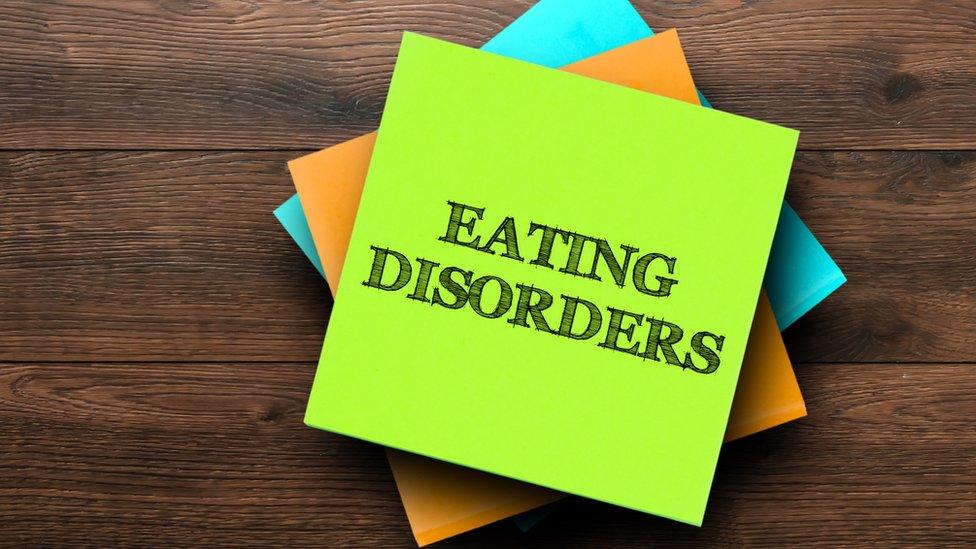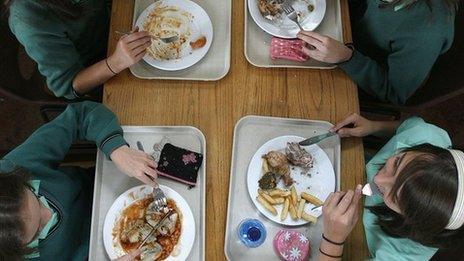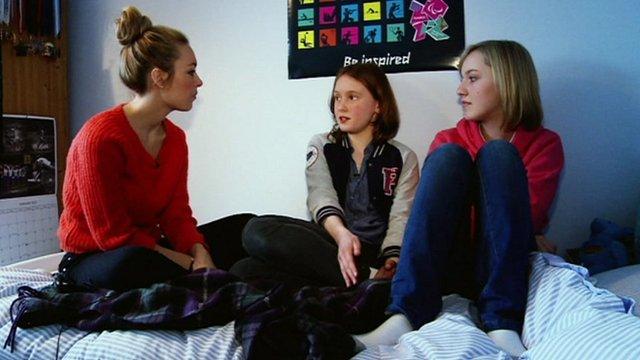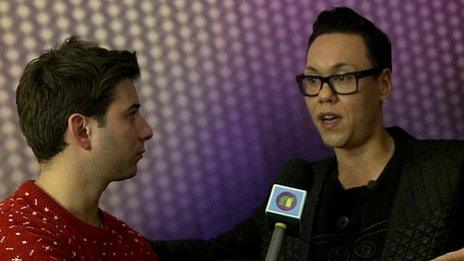What is an eating disorder?
- Published

When somebody has an unhealthy relationship with food, this can cause an eating disorder.
Many people have problems with eating at some time in their lives. These problems can range from not liking certain foods (which happens to most people) to serious eating problems, which may come from medical or emotional troubles.
There are many thousands of people in the UK who struggle with eating disorders, so it's important to know about them.
What is an eating disorder?
An eating disorder is a form of mental illness. It can happen when somebody has an unhealthy relationship with their food and adopts extreme behaviours as a result, which can make them very unwell.
If a person does not have any physical symptoms, you may not be able to tell that someone has an eating disorder by looking at them.
Eating disorders don't only happen when somebody does not eat enough food and loses too much weight.
Eating too much food and putting on an unhealthy amount of weight can be a form of eating disorder too.
How do eating disorders start?
Scientists think eating problems can start in a lot of ways.
Some think that you can be born with more of a likelihood of developing one.
Others believe they're learned from people around you - for example, people who are famous making you feel a certain way about yourself.
Eating problems can also start because of other issues, such as unhappiness at home or school, someone you know dying, or a mixture of these and other things.

There is no one issue that causes an eating disorder to develop, but being unhappy at home or school has been identified as sometimes playing a role
Doctors also believe that those who don't feel in control of their lives may try to take back control through their eating, to give them a sense of power. This can lead to an eating disorder too.
Thankfully, a lot of help is available from doctors and from charities. You can find out about places where you can get help at the bottom of this page.
How can eating disorders affect someone?
Eating disorders can affect people in one of three different ways.
Physically - They can have an effect on how someone looks, if a person loses or gains a noticeable amount of weight, or their skin, hair and nails become unhealthy because their body is not getting the right nutrients
Psychologically - They can have an effect on how someone thinks or feels, and could even form part of wider mental health issues
Socially - They can have an effect on how someone behaves if they shut themselves off from people or become secretive as they try to hide their disorder from other people
Eating disorders are complex, and their causes and symptoms are not always easy to understand or identify.
But there are three main conditions which cover a lot of cases - anorexia nervosa, bulimia nervosa, and binge eating disorder.
1. What is anorexia nervosa?
If someone has anorexia nervosa (often shortened to anorexia), they will avoid eating and lose a lot of weight very quickly.
They often feel fat, even when they are the opposite.
They may use other ways of staying thin, such as taking tablets which make them go to the toilet more often or doing too much exercise.

Someone with an eating disorder might find they become fixated with what they look like
They can become very weak and without special help, some people with anorexia can lose their life as a result of the condition.
People with this condition often go to extreme lengths to hide their behaviour.
2. What is bulimia nervosa?
Someone with bulimia nervosa (often shortened to bulimia) will eat lots of food, but then make themselves sick to get rid of what they've eaten.
Eating lots of food like this is called binge eating and then being sick afterwards is referred to as purging.
People with bulimia may not look underweight and so may find it easier to hide their eating problems.
Binge eating and vomiting can eventually do serious damage to the teeth, heart, kidneys and muscles, so it is a very serious condition.
Again, people with bulimia will often try to keep their behaviour private.
3. What is binge eating disorder?
Someone who has a binge eating disorder loses control of what they are eating and regularly eats too much - even if they're not hungry.
Unlike someone with bulimia, though, they will not make themselves sick afterwards so they often put on an unhealthy amount of weight.
What are the signs of an eating disorder?
There is no simple way to spot when somebody might have an eating disorder.
Not only that, but many of the signs which could indicate an eating disorder could actually be something entirely different, so it is important not to make assumptions.
There are some things that you can look out for though:
Someone having the wrong idea of what they look like, thinking they are very overweight when they aren't at all
An unhealthy interest in how much they weigh
Exercising too much
Obsessive behaviour
Shutting themselves off from the world
Having extremely negative feelings, and feeling really low or down
Feeling excessively tired or sluggish
Regularly having tummy problems, bloating or swelling, or constipation (where you can't go to the loo easily)
If you are at all worried that someone you know might be displaying these signs, or if you're worried about how you feel yourself, the next section of this article has advice about who you might wish to talk to.

If you're at all worried by anything that you have read here, go to speak to an adult that you trust
Where can you go for help?
If you are at all worried or you have any questions about anything that you have read in this guide, it's really important that you speak to an adult that you trust.
This might be a parent, another relative, a teacher or even a special counsellor.
If you're not sure who to talk to, but you know you want to speak to someone, give Childline a ring on 0800 1111 and they can give you advice.
Also you can talk to Beat - a charity that helps people with eating disorders - on their youth line on 0845 634 7650, which is open Monday and Wednesday 10.30am - 7.30pm and Tuesday, Thursday and Friday 10.30am - 6.30pm.
- Published20 February 2012

- Published20 February 2012

- Published22 February 2012

